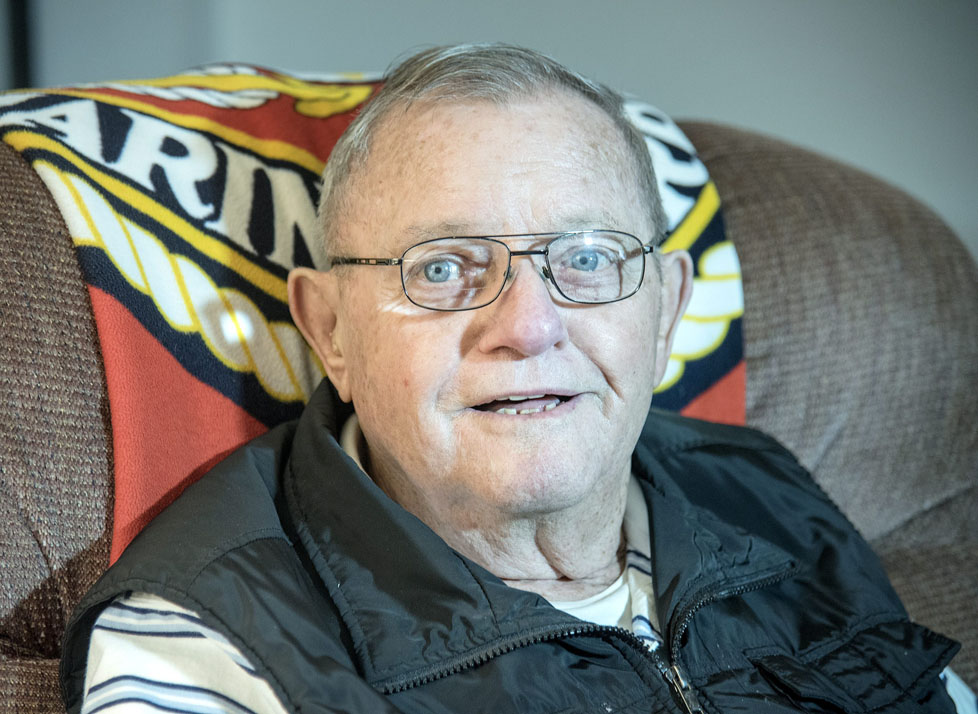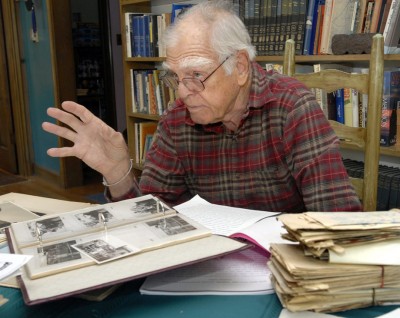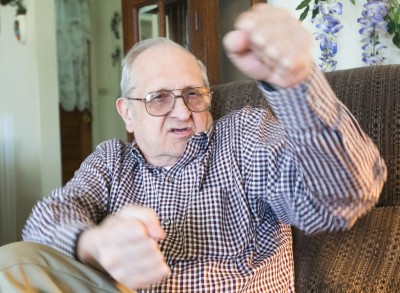Earl McClintock
By Paul Wood

Photo By Rick Danzl/The News-Gazette
CHAMPAIGN — Earl McClintock arrived in Korea six months before the armistice of 1953, but not too late to experience a horrific winter, as well as a battle close enough that warriors were lobbing hand grenades at each other.
The Marine buck sergeant arrived early in January 1953 and was shipped right up to the front lines as enemy forces made a last attack to try to gain negotiating power.
McClintock, 85, grew up in Pittsburgh and enlisted in the Marines as a “gung ho” recruit.
He was 20 when he was sent, via a long troop ship trip crossing of the Pacific, to central Korea and a hill whose name (a number) he can no longer recall.
Altogether, he spent four years in the Marines, including a few months in Quantico that he disliked because it was little besides constant inspection for visiting politicians.
What he recalls most is, as an artillery spotter, serving on a hill that was taken by Chinese and North Korean troops, so that the Army infantry he was serving with were recalled, only to be sent back, and he with them.
“I served in two actions, both on the same hill,” McClintock recalled. “It was one cold place, but we were better prepared than in the early time of the war, at Chosin Reservoir.”
The Chosin Reservoir campaign was a surprising setback for U.N. forces, mainly from the United States, who had been taking back territory from an earlier invasion and had entered North Korea, McClintock said.
In November 1950 and into December, confident U.N. troops were suddenly surrounded by about 120,000 Chinese troops.
They were able to make a fighting evacuation that took them out of that swath of North Korea.
Losses were heavy for Army and Marine troops. A Siberian cold front took temperatures to as low as minus-35, and the frozen ground and winds caused frostbite casualties, impassable roads — and even guns too cold to fire.
But McClintock’s Marines as well as their Army counterparts benefited from better planning by 1953.
“By this time, we had insulated rubber boots and big heavy parkas,” McClintock said. “We slept in those parkas.”
As an artillery spotter, McClintock had to be at the front lines, so he bunked with a Navy corpsman and was mostly with infantry on his hill.
“The Chinese were trying to gain negotiating power, and it was a hell of a battle for that hill,” the Marine recalled.
“It was trench warfare, like World War I. The battle wasn’t quite hand-to-hand, but it was close enough,” he said.
His group was tossing grenades down the hill to hold off the invaders, McClintock said.
“They pushed us off the hill; actually, we were called back to regroup,” he said.
Almost immediately — a couple of days later — it was time to take back the hill. They did, again with heavy losses, McClintock said.
After “a lot of back and forth,” peace negotiations reached a point where the pace of battle slowed and ended, he said.
During this time, there was an exchange of prisoners, and McClintock was assigned to buddy up with one of the emaciated former internees.
He had to keep his fellow Marines from trying to adjust to new surroundings too fast.
“We had to keep them from eating and drinking too much too fast,” he said. “And it was the first time in my life I was ever hugged by a man, an emotional moment.”
There was also an attempt to help the village by setting up a laundry service to bring in dollars for the economy.
“We tried to help wherever we could,” he said
There was also a huge Christmas party for the orphans, he added.
After leaving the Marines, he worked mainly in distribution, including in California, where he met his wife. Eventually, he was transferred here.
They have two daughters and three grandsons who live nearby.
Do you know a veteran who could share a story about military service? Contact staff writer Paul Wood at pwood@news-gazette.com.
Read more stories from local veterans:
 Ralph Langenheim
URBANA — A D-Day veteran calls his own service in World War II “small potatoes.” Fresh out of geological engineering sch …
Ralph Langenheim
URBANA — A D-Day veteran calls his own service in World War II “small potatoes.” Fresh out of geological engineering sch …
 Ralph Hamilton
RANTOUL — When Viet Cong fighters infiltrated Ralph Hamilton’s camp near an extensive tunnel system, they had the opport …
Ralph Hamilton
RANTOUL — When Viet Cong fighters infiltrated Ralph Hamilton’s camp near an extensive tunnel system, they had the opport …
 Eric Swenson
PAXTON — In Ar-Ramadi, Iraq, as part of the 2007 surge, Eric Swenson was on a base that was attacked three or four times …
Eric Swenson
PAXTON — In Ar-Ramadi, Iraq, as part of the 2007 surge, Eric Swenson was on a base that was attacked three or four times …